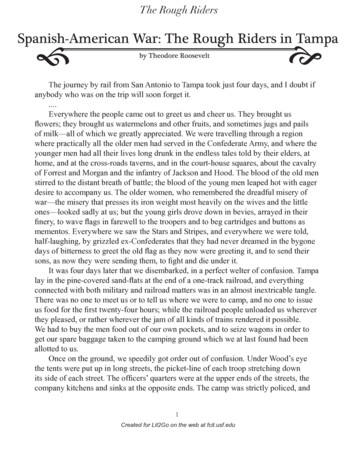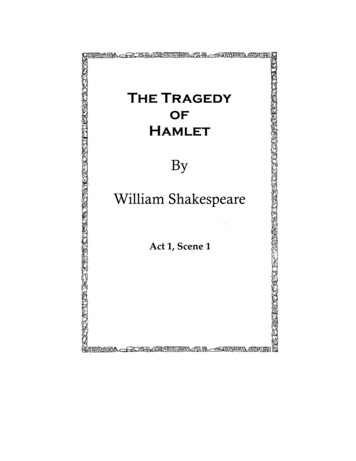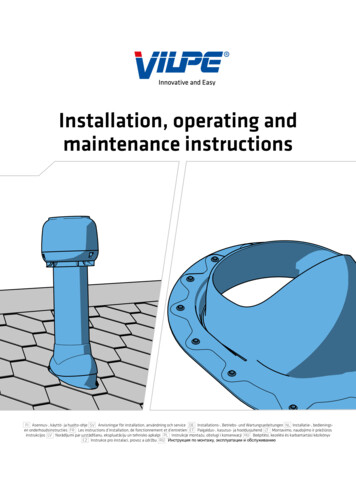
Transcription
The journey by rail from San Antonio to Tampa took just four days, and I doubt ifanybody who was on the trip will soon forget it.Everywhere the people came out to greet us and cheer us. They brought usflowers; they brought us watermelons and other fruits, and sometimes jugs and pailsof milk—all of which we greatly appreciated. We were travelling through a regionwhere practically all the older men had served in the Confederate Army, and where theyounger men had all their lives long drunk in the endless tales told by their elders, athome, and at the cross-roads taverns, and in the court-house squares, about the cavalryof Forrest and Morgan and the infantry of Jackson and Hood. The blood of the old menstirred to the distant breath of battle; the blood of the young men leaped hot with eagerdesire to accompany us. The older women, who remembered the dreadful misery ofwar—the misery that presses its iron weight most heavily on the wives and the littleones—looked sadly at us; but the young girls drove down in bevies, arrayed in theirfinery, to wave flags in farewell to the troopers and to beg cartridges and buttons asmementos. Everywhere we saw the Stars and Stripes, and everywhere we were told,half-laughing, by grizzled ex-Confederates that they had never dreamed in the bygonedays of bitterness to greet the old flag as they now were greeting it, and to send theirsons, as now they were sending them, to fight and die under it.It was four days later that we disembarked, in a perfect welter of confusion. Tampalay in the pine-covered sand-flats at the end of a one-track railroad, and everythingconnected with both military and railroad matters was in an almost inextricable tangle.There was no one to meet us or to tell us where we were to camp, and no one to issueus food for the first twenty-four hours; while the railroad people unloaded us whereverthey pleased, or rather wherever the jam of all kinds of trains rendered it possible.We had to buy the men food out of our own pockets, and to seize wagons in order toget our spare baggage taken to the camping ground which we at last found had beenallotted to us.Once on the ground, we speedily got order out of confusion. Under Wood’s eyethe tents were put up in long streets, the picket-line of each troop stretching downits side of each street. The officers’ quarters were at the upper ends of the streets, thecompany kitchens and sinks at the opposite ends. The camp was strictly policed, and Created for Lit2Go on the web at fcit.usf.edu
Spanish-American War: The Rough Riders in Tampadrill promptly begun. For thirty-six hours we let the horses rest, drilling on foot, andthen began the mounted drill again. The regiments with which we were afterwardto serve were camped near us, and the sandy streets of the little town were throngedwith soldiers, almost all of them regulars; for there were but one or two volunteerorganizations besides ourselves. The regulars wore the canonical dark blue of UncleSam. Our own men were clad in dusty brown blouses, trousers and leggings being ofthe same hue, while the broad-brimmed soft hat was of dark gray; and very workmanlike they looked as, in column of fours, each troop trotted down its company street toform by squadron or battalion, the troopers sitting steadily in the saddles as they madetheir half-trained horses conform to the movement of the guidons.Over in Tampa town the huge winter hotel was gay with general officers and theirstaffs, with women in pretty dresses, with newspaper correspondents by the score, withmilitary attaches of foreign powers, and with onlookers of all sorts; but we spent verylittle time there.We worked with the utmost industry, special attention being given by each troopcommander to skirmish-drill in the woods. Once or twice we had mounted drillof the regiment as a whole.Themilitary attaches came out to lookon—English,German,Russian,French, and Japanese. Withthe Englishman, Captain ArthurLee, a capital fellow, we soonstruck up an especially closefriendship; and we saw much ofhim throughout the campaign.So we did of several of thenewspaper2Created for Lit2Go on the web at fcit.usf.edu
Spanish-American War: The Rough Riders in Tampacorrespondents—Richard Harding Davis, John Fox, Jr., Caspar Whitney, and FredericRemington. On Sunday Chaplain Brown, of Arizona, held service, as he did almostevery Sunday during the campaign.There were but four or five days at Tampa, however. We were notified that theexpedition would start for destination unknown at once, and that we were to go with it;but that our horses were to be left behind, and only eight troops of seventy men eachtaken. Our sorrow at leaving the horses was entirely outweighed by our joy at going;but it was very hard indeed to select the four troops that were to stay, and the men whohad to be left behind from each of the troops that went. Colonel Wood took MajorBrodie and myself to command the two squadrons, being allowed only two squadroncommanders. The men who were left behind felt the most bitter heartburn. To the greatbulk of them I think it will be a life-long sorrow. I saw more than one, both among theofficers and privates, burst into tears when he found he could not go. No outsider canappreciate the bitterness of the disappointment. Of course, really, those that stayed wereentitled to precisely as much honor as those that went. Each man was doing his duty,and much the hardest and most disagreeable duty was to stay. Credit should go with theperformance of duty, and not with what is very often the accident of glory. All this andmuch more we explained, but our explanations could not alter the fact that some had tobe chosen and some had to be left. One of the Captains chosen was Captain Maximilian Created for Lit2Go on the web at fcit.usf.edu
Spanish-American War: The Rough Riders in TampaLuna, who commanded Troop F, from New Mexico. The Captain’s people had been onthe banks of the Rio Grande before my forefathers came to the mouth of the Hudsonor Wood’s landed at Plymouth; and he made the plea that it was his right to go as arepresentative of his race, for he was the only man of pure Spanish blood who bore acommission in the army, and he demanded the privilege of proving that his people wereprecisely as loyal Americans as any others. I was glad when it was decided to take him.It was the evening of June 7th when we suddenly received orders that theexpedition was to start from Port Tampa, nine miles distant by rail, at daybreak thefollowing morning; and that if we were not aboard our transport by that time we couldnot go. We had no intention of getting left, and prepared at once for the scramble whichwas evidently about to take place. As the number and capacity of the transports wereknown, or ought to have been known, and as the number and size of the regiments togo were also known, the task of allotting each regiment or fraction of a regiment to itsproper transport, and arranging that the regiments and the transports should meet in dueorder on the dock, ought not to have been difficult. However, no arrangements weremade in advance; and we were allowed to shove and hustle for ourselves as best wecould, on much the same principles that had governed our preparations hitherto.We were ordered to be at a certain track with all our baggage at midnight, thereto take a train for Port Tampa. At the appointed time we turned up, but the train didnot. The men slept heavily, while Wood and I and various other officers wanderedabout in search of information which no one could give. We now and then came acrossa Brigadier-General, or even a Major-General; but nobody knew anything. Someregiments got aboard the trains and some did not, but as none of the trains startedthis made little difference. At three o’clock we received orders to march over to anentirely different track, and away we went. No train appeared on this track either; butat six o’clock some coal-cars came by, and these we seized. By various arguments wepersuaded the engineer in charge of the train to back us down the nine miles to PortTampa, where we arrived covered with coal-dust, but with all our belongings.The railway tracks ran out on the quay, and the transports, which had beenanchored in midstream, were gradually being brought up alongside the quay andloaded. The trains were unloading wherever they happened to be, no attention whateverbeing paid to the possible position of the transport on which the soldiers were to go.Colonel Wood and I jumped off and started on a hunt, which soon convinced us thatwe had our work cut out if we were to get a transport at all. From the highest Generaldown, nobody could tell us where to go to find out what transport we were to have.At last we were informed that we were to hunt up the depot quartermaster, Colonel Created for Lit2Go on the web at fcit.usf.edu
Spanish-American War: The Rough Riders in TampaHumphrey. We found his office, where his assistant informed us that he didn’t knowwhere the Colonel was, but believed him to be asleep upon one of the transports. Thisseemed odd at such a time; but so many of the methods in vogue were odd, that wewere quite prepared to accept it as a fact. However, it proved not to be such; but for anhour Colonel Humphrey might just as well have been asleep, as nobody knew wherehe was and nobody could find him, and the quay was crammed with some ten thousandmen, most of whom were working at cross purposes.At last, however, after over an hour’s industrious and rapid search through thisswarming ant-heap of humanity, Wood and I, who had separated, found ColonelHumphrey at nearly the same time and were allotted a transport—the Yucatan. She wasout in midstream, so Wood seized a stray launch and boarded her. At the same timeI happened to find out that she had previously been allotted to two other regiments—the Second Regular Infantry and the Seventy-first New York Volunteers, whichlatter regiment alone contained more men than could be put aboard her. Accordingly,I ran at full speed to our train; and leaving a strong guard with the baggage, I doublequicked the rest of the regiment up to the boat, just in time to board her as she cameinto the quay, and then to hold her against the Second Regulars and the Seventy-first,who had arrived a little too late, being a shade less ready than we were in the matter ofindividual initiative. There was a good deal of expostulation, but we had possession;and as the ship could not contain half of the men who had been told to go aboard her,the Seventy-first went away, as did all but four companies of the Second. These latterwe took aboard. Meanwhile a General had caused our train to be unloaded at the end ofthe quay farthest from where the ship was; and the hungry, tired men spent most of theday in the labor of bringing down their baggage and the food and ammunition.The officers’ horses were on another boat, my own being accompanied by mycolored body-servant, Marshall, the most faithful and loyal of men, himself an oldsoldier of the Ninth Cavalry. Marshall had been in Indian campaigns, and he christenedmy larger horse “Rain-in-the-Face,” while the other, a pony, went by the name of“Texas.”By the time that night fell, and our transport pulled off and anchored in midstream,we felt we had spent thirty-six tolerably active hours. The transport was overloaded, themen being packed like sardines, not only below but upon the decks; so that at night itwas only possible to walk about by continually stepping over the bodies of the sleepers.The travel rations which had been issued to the men for the voyage were not sufficient,because the meat was very bad indeed; and when a ration consists of only four or fiveitems, which taken together just meet the requirements of a strong and healthy man, the Created for Lit2Go on the web at fcit.usf.edu
Spanish-American War: The Rough Riders in Tampaloss of one item is a serious thing. If we had been given canned corned beef we wouldhave been all right, but instead of this the soldiers were issued horrible stuff called“canned fresh beef.” There was no salt in it. At the best it was stringy and tasteless;at the worst it was nauseating. Not one-fourth of it was ever eaten at all, even whenthe men became very hungry. There were no facilities for the men to cook anything.There was no ice for them; the water was not good; and they had no fresh meat or freshvegetables.However, all these things seemed of small importance compared with the factthat we were really embarked, and were with the first expedition to leave our shores.But by next morning came the news that the order to sail had been countermanded,and that we were to stay where we were for the time being. What this meant none ofus could understand. It turned out later to be due to the blunder of a naval officer whomistook some of our vessels for Spaniards, and by his report caused consternation inWashington, until by vigorous scouting on the part of our other ships the illusion wasdispelled.Meanwhile the troop-ships, packed tight with their living freight, sweltered in theburning heat of Tampa Harbor. There was nothing whatever for the men to do, spacebeing too cramped for amusement or for more drill than was implied in the manual ofarms. In this we drilled them assiduously, and we also continued to hold school for boththe officers and the non-commissioned officers. Each troop commander was regardedas responsible for his own non-commissioned officers, and Wood or myself simplydropped in to superintend, just as we did with the manual of arms. In the officers’school Captain Capron was the special instructor, and a most admirable one he was.The heat, the steaming discomfort, and the confinement, together with the forcedinaction, were very irksome; but everyone made the best of it, and there was littleor no grumbling even among the men. All, from the highest to the lowest, were bentupon perfecting themselves according to their slender opportunities. Every book oftactics in the regiment was in use from morning until night, and the officers and noncommissioned officers were always studying the problems presented at the schools.About the only amusement was bathing over the side, in which we indulged both in themorning and evening. Many of the men from the Far West had never seen the ocean.One of them who knew how to swim was much interested in finding that the oceanwater was not drinkable. Another, who had never in his life before seen any watermore extensive than the headstream of the Rio Grande, met with an accident later inthe voyage; that is, his hat blew away while we were in mid-ocean, and I heard himexplaining the accident to a friend in the following words: “Oh-o-h, Jim! Ma hat blew Created for Lit2Go on the web at fcit.usf.edu
Spanish-American War: The Rough Riders in Tampainto the creek!” So we lay for nearly a week, the vessels swinging around on theiranchor chains, while the hot water of the bay flowed to and fro around them and the sunburned overhead.At last, on the evening of June 13th, we received the welcome order to start. Shipafter ship weighed anchor and went slowly ahead under half-steam for the distantmouth of the harbor, the bands playing, the flags flying, the rigging black with theclustered soldiers, cheering and shouting to those left behind on the quay and to theirfellows on the other ships. The channel was very tortuous; and we anchored beforewe had gone far down it, after coming within an ace of a bad collision with anothertransport. The next morning we were all again under way, and in the afternoon the greatfleet steamed southeast until Tampa Light sank in the distance. Created for Lit2Go on the web at fcit.usf.edu
Humphrey. We found his office, where his assistant informed us that he didn’t know where the Colonel was, but believed him to be asleep upon one of the transports. This seemed odd at such a time; but so many of the methods in vogue were odd, that we were quite prepared to accept it










